

Stop, Start, Continue: Conceptual Understanding Meets Applied Problem Solving. I recently became the Chief Academic Officer for the International Baccalaureate (IB) after more than two decades of working in and leading IB schools.
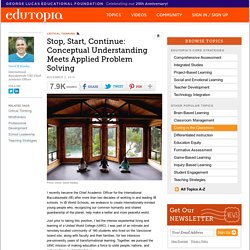
In IB World Schools, we endeavor to create internationally-minded young people who, recognizing our common humanity and shared guardianship of the planet, help make a better and more peaceful world. Just prior to taking this position, I led the intense experiential living and learning of a United World College (UWC). I was part of an intimate and remotely-located community of 160 students who lived on the Vancouver Island site, along with faculty and their families, for two intensive pre-university years of transformational learning. Conservation Programs. The United States Department of Agriculture Farm Service Agency (FSA) oversees a number of voluntary conservation-related programs.
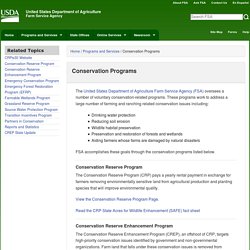
These programs work to address a large number of farming and ranching related conservation issues including: Drinking water protectionReducing soil erosionWildlife habitat preservationPreservation and restoration of forests and wetlandsAiding farmers whose farms are damaged by natural disasters FSA accomplishes these goals through the conservation programs listed below. The Conservation Reserve Program (CRP) pays a yearly rental payment in exchange for farmers removing environmentally sensitive land from agricultural production and planting species that will improve environmental quality. View the Conservation Reserve Program Page. Read the CRP State Acres for Wildlife Enhancement (SAFE) fact sheet View the Conservation Reserve Enhancement Program page. View the Emergency Conservation Program page. View the Emergency Forest Restoration Program page. Fostering Student Questions: Strategies for Inquiry-Based Learning.
Ramsey Musallam’s TED Talk on his "3 Rules to Spark Learning" inspires the need to foster students' curiosity.
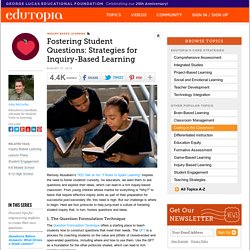
As educators, we want them to ask questions and explore their ideas, which can lead to a rich inquiry-based classroom. From young children whose mantra for everything is "Why? " to teens that require effective inquiry skills as part of their preparation for successful post-secondary life, this need is high. But our challenge is where to begin. Here are four protocols to help jump-start a culture of fostering student inquiry that, in turn, fosters questions and ideas. 1.
The Question Formulation Technique offers a starting place to teach students how to construct questions that meet their needs. 2. One challenge to generating substantive questions and ideas is getting every student's voice heard. Post a topic as a statement starter or a question on chart paper for small groups. 3. Divide students into groups of 2-4. 4. Another benefit is providing practice with collaboration.
New Teachers: Designing Learning Environments. The Importance of Classroom Design Why does the physical design of classrooms matter?
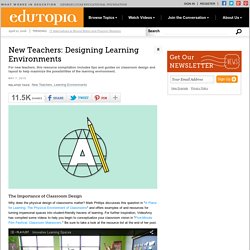
Mark Phillips discusses this question in "A Place for Learning: The Physical Environment of Classrooms" and offers examples of and resources for turning impersonal spaces into student-friendly havens of learning. For further inspiration, VideoAmy has compiled some videos to help you begin to conceptualize your classroom vision in "Five-Minute Film Festival: Classroom Makeovers. " Be sure to take a look at the resource list at the end of her post.
Learning Zones, Seating, and More. 4 Crucial Lessons New Teachers Never Learned. If you are a new teacher, these four lessons just might impact your teaching career more than anything you ever learned in college or in your pre-service days.
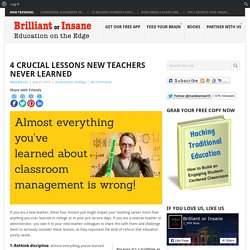
If you are a veteran teacher or administrator, you owe it to your new teacher colleagues to share this with them and challenge them to seriously consider these lessons, as they represent the kind of reform that education sorely needs. Because it’s a tradition as old as education itself, grading has stood the test of time; numbers, percentages and letters are simply the only modes of assessment the average educator comprehends. 1–Rethink discipline. Almost everything you’ve learned about classroom management is wrong. In methods courses and pre-service work, you were most likely taught some kind of assertive discipline technique or, worse, zero tolerance policies. The best plan is to talk to your students about building a learning community built on mutual respect. 2–Find great material. 3–Never assign traditional homework. Why the Best Teachers Don't Give Tests - Alfie Kohn.
More Progressive Ways to Measure Deeper Levels of Learning. How do we measure learning beyond knowledge of content?
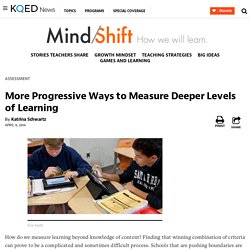
Finding that winning combination of criteria can prove to be a complicated and sometimes difficult process. Schools that are pushing boundaries are learning that it takes time, a lot of conversation, and a willingness to let students participate in that evaluation. “Most schools and most of our learning stops at knowing and we need to move that and broaden it to the doing and the reflecting,” said Bob Lenz, co-founder & chief executive officer of Envision Schools while participating in a Deeper Learning MOOC panel. The charter network’s teachers follow three steps for assessment: know, do, reflect. Skills like critical thinking, problem-solving, and collaboration require practice, Lenz said.
“The real power comes in the reflective process, both individually and with peers,” Lenz said. Having a rubric doesn’t mean students aren’t engaged in the assessment process or that there’s no room for surprise or creativity. More Progressive Ways to Measure Deeper Levels of Learning. LateWork_RickWormeli.pdf.